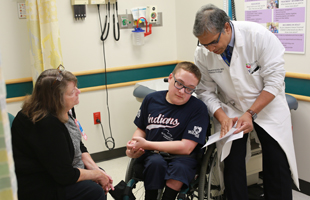New Strategy Helps Patients Transition Into the Adult Care Setting
 For patients with complex urological conditions, transitioning from the pediatric to adult-care setting can be challenging. A new initiative at Cincinnati Children’s is helping ease the journey, with a standardized process that begins during the teen years.
For patients with complex urological conditions, transitioning from the pediatric to adult-care setting can be challenging. A new initiative at Cincinnati Children’s is helping ease the journey, with a standardized process that begins during the teen years.
The initiative is for patients with complex urology issues, such as myelomeningocele, posterior urethral valves, and cloaca and anorectal malformation.
“By the time these patients are in their early 20s, they should be seeing adult-care providers in a tertiary medical center, because that is the ideal environment for them to receive optimal urological care,” says Andrew Strine, MD, a pediatric urologist who serves as physician lead for the initiative. “Another advantage is that when these patients experience non-urologic issues, such as heart disease, fertility concerns and non-healing wounds, the adult care provider is in the best position to make a referral to another specialist.”
A gradual process
As part of this initiative, pediatric urologists talk to patients about the transition during every checkup between the ages of 16 and 21. Guiding these conversations is a brochure developed at Cincinnati Children’s, which includes a checklist and tips to help patients become better advocates for their own health care. The physicians use a separate checklist for patients who are older than 21, with the goal of transitioning them more quickly. The transition to adult care is delayed for any patient who is medically unstable or needs surgery in the near future.
When the time comes for a patient to transition (typically at age 21), the physician makes a referral to one of several skilled urologists at a practice at University of Cincinnati Medical Center. Prior to the first appointment, a medical assistant within that practice collects all pertinent records, including operative reports, radiological images and a summary of supplies and medications used. If the patient decides to see a different adult-care provider, the team at Cincinnati Children’s will help make that transition as smooth as possible as well.
The initiative is demonstrating early success. In April 2018, the care team identified 107 patients age 21 or older who met the criteria to transition. At the one-year mark, 60 of those patients (56%) had made an appointment with an adult-care provider; 22 had successfully transitioned and are no longer returning to Cincinnati Children’s for their care.
A second group of patients age 16-20 was identified as being ready to begin the transition process in April 2018. At the one-year mark, 152 of these 230 patients (about 66%) had received the brochure and conversed with their physician about the transition process.

